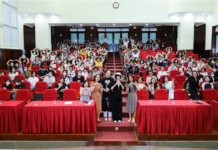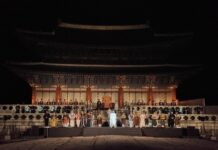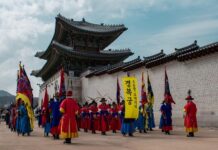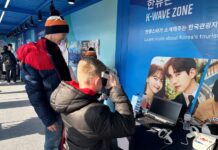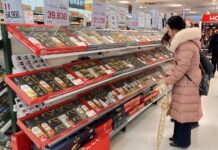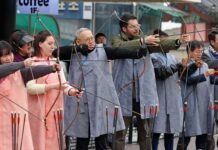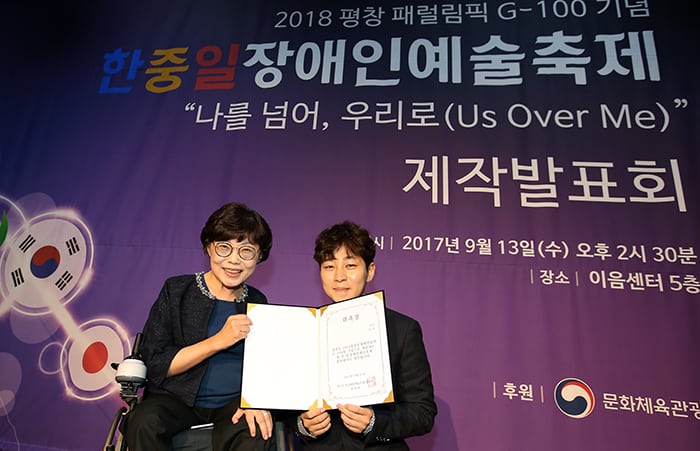
Korea Disabled Artist Association President Bang Gui-hee (left) poses for a commemorative photo with singer DinDin who has been appointed as an honorary ambassador for the PyeongChang 2018 Paralympic Winter Games, during a press conference in Seoul on Sept. 13. The upcoming Korea-China-Japan Artists Festival for the Disabled opens on Nov. 29, marking 100 days until the Paralympic Winter Games.
By Sohn JiAe and Kim Tae Won
Photos = Jeon Han
Seoul l Sept. 13, 2017
The Korea Disabled Artist Association (KDAA) announced the upcoming Korea-China-Japan Artists Festival for the Disabled at a press conference in Seoul on Sept. 13. The festival opens on Nov. 29, exactly 100 days before PyeongChang 2018 Paralympic Winter Games, and its theme this year is “Us Over Me” (나를 넘어, 우리로).
As the PyeongChang 2018 Paralympic Winter Games will be followed by the Tokyo 2020 Paralympic Games and then the Beijing 2022 Paralympic Winter Games, more than 60 artists with disabilities from the three countries will come together at the festival in the hope that all three sporting events will be successful.
The festival will kick off on Nov. 29 with a meeting between the artists from all three countries. On Nov. 30, the festival will begin in earnest with the artists appearing on stage and performing at the KBS Hall in Seoul.
Representing Korea are Jang Seong-bin, a mentally disabled singer who will give a few renditions of the song “Arirang,” visually impaired pianist Kim Yeji and calligrapher Lee Eun-hee, who is paralyzed from the waist down.
A group of 13 hearing-impaired dancers from the China Disabled People’s Performing Art Troupe and two singers confined to wheelchairs will represent Beijing. From Japan, dancer Koichi Omae and Izumi Tateno, known as the “left-handed pianist,” will perform. All the performances will be recorded and broadcast on KBS at 11:40 p.m. that day.
After the Seoul show, the artists will move to Gangneung, Gangwon-do Province, one of the host cities for the PyeongChang 2018 Olympic and Paralympic Winter Games, on Dec. 1 for a show there.

KOCIS Director Kim Tae-hoon (right) speaks during a press conference at the I-Eum Cultural Center in Seoul on Sept. 13 where he outlines the upcoming Korea-China-Japan Artists Festival for the Disabled.
“What we learned from the Seoul 1988 Paralympic Games 30 years ago was that physical barriers are coming down,” said Korea Disabled Artist Association President Bang Gui-hee.
“Thirty years later in 2018 in Pyeongchang, our goal is to bring down ‘culture barriers.’ What we should do to break down those barriers is to make the PyeongChang Olympic and Paralympic Winter Games into a ‘Cultural Olympiad.’ Our goal is, also, to let the world know how great the artistry displayed by the disabled can be,” Bang said.
“As we saw the overall situation in the arts among the disabled get much better with the Seoul 1988 Paralympic Games, next year’s PyeongChang 2018 Paralympic Games will hopefully give us the chance to take a leap forward for the disabled,” said Korean Cultural and Information Service (KOCIS) Director Kim Tae-hoon.
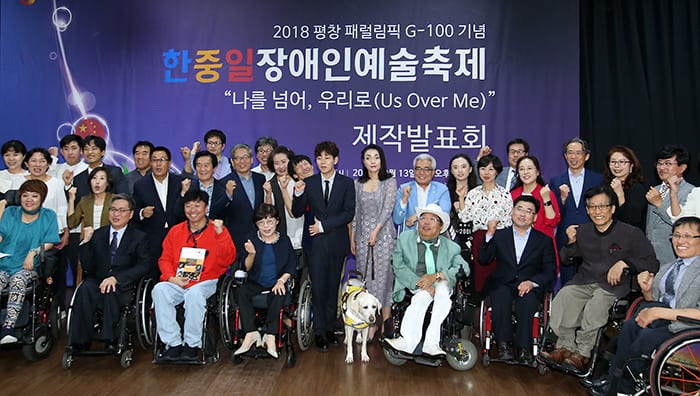
Representatives from Korea, China and Japan pose for a commemorative photo during a press conference for the Korea-China-Japan Artists Festival for the Disabled, at the I-Eum Cultural Center in Seoul on Sept. 13.
jiae5853@korea.kr


